Archives of Whatcha Reading
Whatcha Reading, Paulette Perhach?
Every week we ask an interesting figure what they're digging into. Have ideas who we should reach out to? Let it fly: info@seattlereviewofbooks.com. Want to read more? Check out the archives.
Paulette Perhach is the Seattle-based author of the book Welcome to the Writer's Life: How to Design Your Writing Craft. Her writing has appeared all over the place: Elle, The New York Times, and Slate, just to name a few. She offers coaching to writers (a group session is starting January!). She just published this wonderful piece on Hobart you should read, titled "Risk Mitigation at the Dawn of my Conceivable Extinction".
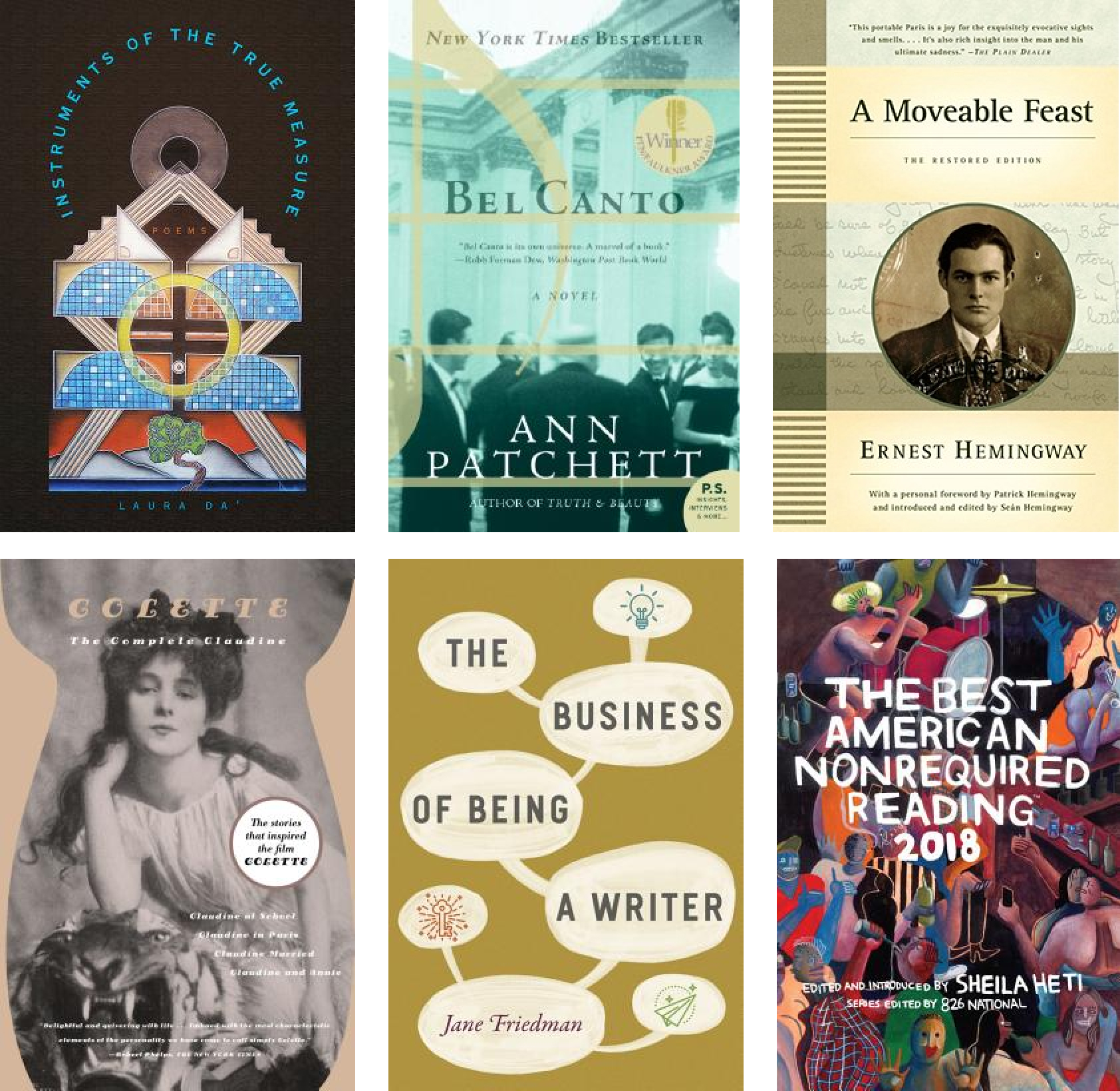
What are you reading now?
I'm reading Laura Da's book of poetry, Instruments of the True Measure. The title refers to themes of measuring land as the first step in removal of the people living there. Laura is in my former Made at Hugo House Fellows writing workshop, and I pretty much just fangirl over her work every time. It’s embarrassing, but I can’t stop.
She’s not afraid of poems wrapped in fog, which lead you through a dreamlike world of ambiguity. After reading a poem, I’m filled with a feeling that I trust is exactly the one she wanted me to feel. Coming to creative writing from the world of journalism, I have much learn from her.
Here’s a section of the title poem I love:
are baptized in the bile
of their own digestion.
Chickasaw in the northern parcel of the state
Choctaw in the central.
Domesday Book scrolls meld into the
linen press
of the Kansas-Nebraska Act.
[insert poetry “mmmmm” here]
What did you read last?
I recently moved and, upon unpacking, found a copy of Ann Patchett’s Bel Canto I’d seen at a thrift store, which is where I like to pick up titles that make me think, “Oh I’ve heard of this.” I’ve been reading so many how-to books this year — about how to be a writer and how to make a living at it — while researching my book Welcome to the Writer’s Life. I was missing that feeling from of a book you can just fall into, one that makes you stay reading in the tub long after you’re raisiney, adding more hot water for one more chapter, one more chapter, one more chapter. Bel Canto answered the call wonderfully. It made me want to take up my novel again, and it tricked me — at least for a week — into thinking I loved opera.
What I admired most was how Patchett balanced dozens of characters and multiple languages in a way that never left me confused. She also described the music in a way that could have fallen so flat, but instead made me feel like I was hearing it live.
What are you reading next?
I’m off the travel-addict wagon and am flying to France on Christmas (which is how my boyfriend found us $600 tickets, so not too bad). I’m trying to find a comprehensive but readable book on the French Revolution. With the protests there now and how things feel pre-revolutiony here, I think that is the right story for me, but it turns out it’s hard to find just one. (Internet? Recommendations?) I might just go for A Moveable Feast or The Complete Claudine by Colette. Or I might haul three books across the Atlantic because I’m ridiculous and refuse to get a Kindle or admit I don’t really read that much while traveling.
After that, it’s back to The Business of Being a Writer by Jane Friedman. But I enjoy the entrepreneurial side of being a creative, too.
What book would you recommend as a holiday gift?
I'm always going to be that aunt trying to force young folks to read, and my secret weapon is Best American Nonrequired Reading. I always get a copy for my nephew. It makes a great stand to lean his cell phone against; but once I hide his phone for family read time, I like to see him read it and smirk at the funny parts.
In general, the Best American Series is a fantastic shortcut for anyone you know who likes a particular genre of writing. Now they have best American mystery, sci-fi, fantasy, nature writing, sports writing, and poetry — pretty much all the things. It’s a lovely buffet from which they can sample writers in the field, and any one I read almost always leads me to a writer I come to follow and love. I found Cat Rambo by reading Best American Sci-fi. She included a Seattle reference in her story about a cat. My assumption that she was local turned out to be correct. I eventually met that very cat.
As a writer, it’s so useful to read so many lessons in one place. I reached out to one travel writer to tell him I loved one of his stories, and he’s become a mentor of mine. So the Best American Series can bring magic to friends who are simply readers or readers and writers.
Whatcha Reading, Kristen Millares Young?
Every week we ask an interesting figure what they're digging into. Have ideas who we should reach out to? Let it fly: info@seattlereviewofbooks.com. Want to read more? Check out the archives.
Kristen Millares Young is the author of the upcoming Subduction (Red Hen Press, spring 2020), as well as an essayist and journalist. She's the current Prose Writer-in-Residence at Hugo House. Mark your calendar now! See Kristen read, sing, and perform with a host of others in "Lit Jam: a Night of Words and Music" at Hugo House on March 8, and catch her off-site during AWP reading from “Every woman keeps a flame against the wind.” to celebrate Latina Outsiders: Remaking Latina Identity, in Portland, March 27 at the Milagro theater.
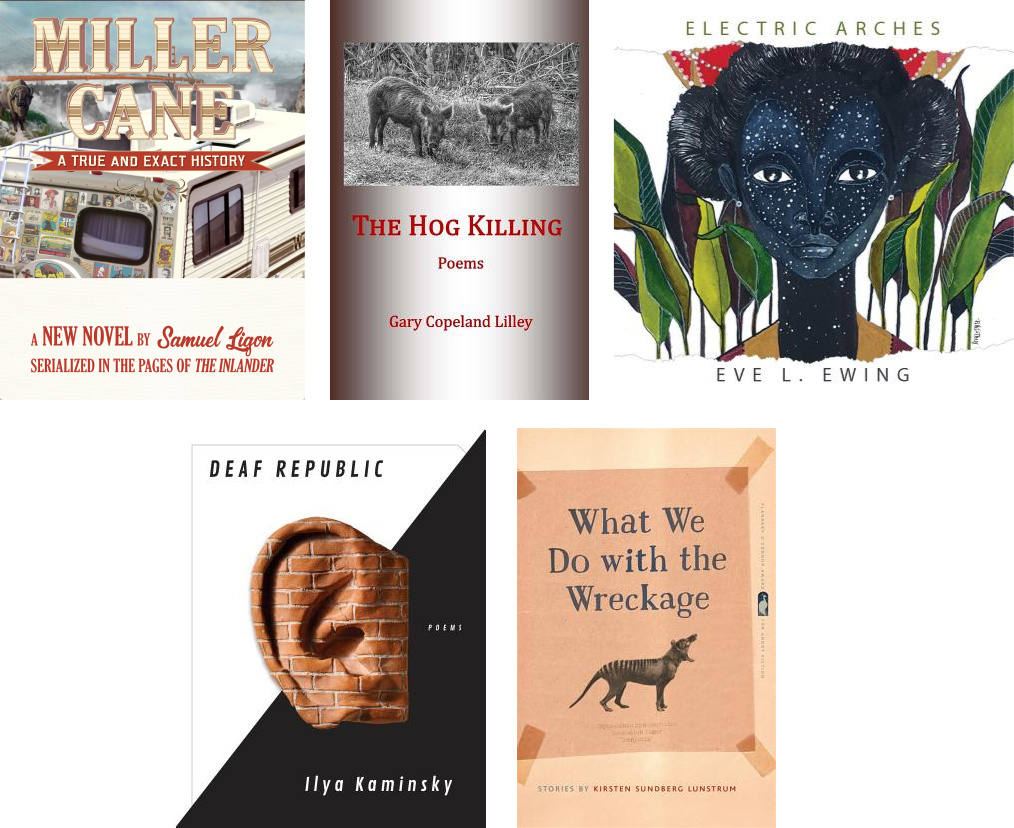
What are you reading now?
Sam Ligon’s Miller Cane: A True and Exact History, serialized in the Inlander, is the only reason I look forward to opening my email, where I get a weekly installment. Miller Cane lives the long con, and his marks are the victims of massacres. A fraudulent historian, Cane goes on the lam “to save the young daughter of the woman he loves, taking her with him on his roadshow across the worn-out heart of America, staying one step ahead of what’s after them.”
Miller Cane is a satire. Miller Cane is deadly serious. In this epic road trip novel, Ligon evokes the zeitgeist of our cultural obsessions with guns and healing while maintaining the pacing of a potboiler. His prose is unmistakable – taut, acerbic and driven by hope for a country whose rules he criticizes with the relentless fervor of a patriot.
Reading Miller Cane, I laugh so often I have to wonder why few writers make use of their wit to divine the pathos of our collective psyche. Among the many gifts of Miller Cane, aside from its gumshoe plunder of Pacific Northwest places and American history, are Ligon’s insights into parenting and the horrors of loving. Great lines abound.
The Inlander projects that Miller Cane will wrap up in 2019. Writing Miller Cane for weekly deadlines, reading it too on Spokane Public Radio, Ligon reaches for the legacy of that other great serialist, Charles Dickens. The only way out is through. Good luck, Sam.
What did you read last?
Lately, I’ve been flickering between two books of poems:
The Hog Killing by Gary Copeland Lilley, out on Blue Horse Press. Listen to him read “The Car is the Crucial Chariot to Rural Culture,” a poem that’s supple because his language is highly crafted and rooted in place and time. Gary’s poems sound like they come out perfect, a spontaneous rush of observation, thought and action, but his teaching approach is about rigor of vision and revision. I am honored to read with him and Paisley Rekdal on July 14 during the Centrum Port Townsend Writers’ Conference, where, in the afternoons, he’ll help folks resurrect dead poems while I’m teaching fiction.
I received scholar, cultural organizer and sociologist Eve Ewing’s Electric Arches as a gift from my friend Kristen Goessling, an assistant professor at Penn State Brandywine, where she teaches young people to activate their ideals with an artistic practice rooted in social justice and a collaborative pedagogy informed by her love of theory. I’ll read anything Goessling recommends.
After reciting Ewing’s “what I mean when I say I’m sharpening my oyster knife,” I ripped up this week’s syllabus for my Hugo House class and assigned Electric Arches, a mixed media book of poetry, essays and visual art from Haymarket Books. Based in Black reality, cherishing a future born from fierce imaginings for her community, Electric Arches is a true work of art.
What are you reading next?
I have deliberately delayed the gratification of finishing my advance reader’s copy of Deaf Republic by Ilya Kaminsky, with thanks to Bill Carty and Seattle Arts & Lectures. Down hard with a cold, I just cracked Deaf Republic and was stunned into a pause by the first poem, “We Lived Happily During the War.” I am tempted to sample it here, in its entirety, as Kaminsky often does his favorites on Facebook (there is no better person to follow online for a running poetic commentary on our times, as elucidated by exquisitely paired works from his favorite writers). But I will content myself with “in the street of money in the city of money in the country of money.”
A book to savor, a book to devour. I battle my own proclivities to write this paragraph for you, rather than finishing Deaf Republic. Self implicating and expansive, something accusatory resides in his honesty. His litanies are revelations. I will never forget Kaminsky’s performance at the Centrum Port Townsend Writers’ Conference, where Ligon is artistic director. Kaminsky electrified the whole audience with urgent work that refuses our collective silence.
Part of SAL’s Poetry Series, Kaminsky will perform on Monday, April 1 at Broadway Performance Hall, Seattle Central Community College. 7:30 p.m. Deaf Republic comes out March 5 from Graywolf Press.
What book would you recommend most as a holiday gift?
Kirsten Sundberg Lunstrum’s What We Do With The Wreckage, which won the University of Georgia’s Flannery O’Connor Award, is a slow burn. In this potent collection of short stories, Lunstrum maps the perseverance needed to survive the invisibilities of girlhood (and later, marriage and motherhood) to become women seen in our own right.
Amidst subtle scenes and intimate dialogue so real you wonder whether she takes notes at family dinners, Lunstrum breaks form to bring fable into daily life. Throughout, she delivers lyric insights with real authority. “I know that when I open my mouth next, I will speak like this – in gusts, with force. I will sound like fire moving through a forest…”
On Thursday, January 24th, from 7-8:30 p.m. at Hugo House, I will moderate a panel on the state of short fiction. Lunstrum will appear with Ramon Isao, Corinne Manning, Becky Mandelbaum, and E. Lily Yu.
Whatcha Reading, Amelia Bonow?
Every week we ask an interesting figure what they're digging into. Have ideas who we should reach out to? Let it fly: info@seattlereviewofbooks.com. Want to read more? Check out the archives.
Amelia Bonow is the co-founder of Shout Your Abortion. They just released their book, and they're having a book release party this Wednesday, December 5th, at the Neptune Theater. Join Amelia, Lindy West, Angela Garbes, El Sanchez, Alana Edmonson, DJs Stas & Moni, and the star-studded SYA house band for an amazing evening of "Reading, Shouting, and Performance," from a group of women who used the power of their true experiences to radically change the public conversation on abortion.
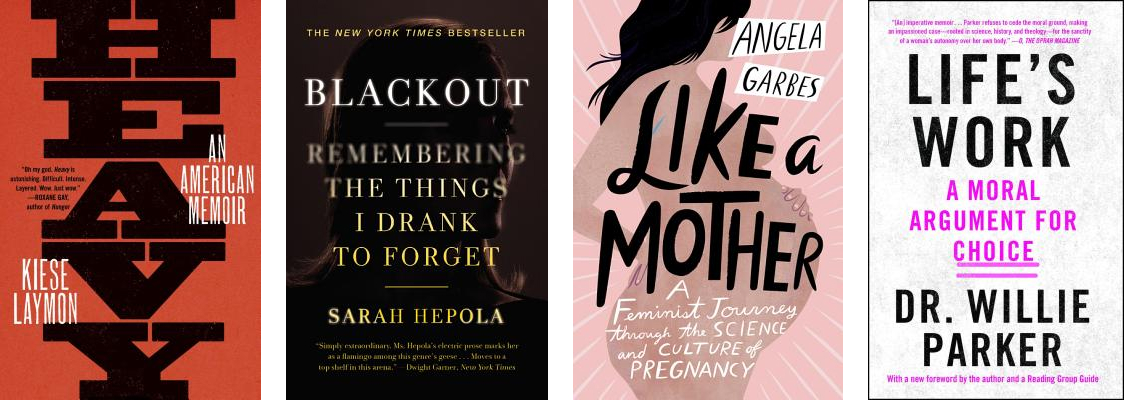
What are you reading now?
Heavy by Kiese Laymon. It’s a memoir about the author growing up in Mississippi, in the form of a letter to his mother, who was a brilliant black academic. His voice is singular and enormous; the title of the book feels like the only title it could have possibly had. It’s gorgeous and absolutely devastating in a way that feels acutely American.
What did you read last?
I read a book called Blacking Out: Remembering the things I drank to forgot by Sarah Hepola. It’s a memoir in which the author eventually gets sober. I really appreciated it because it wasn’t like “now I’m sober and everything is fine,” it was more like “now I’m sober and everything is weird in a different way that is probably slightly better”. It feels like everyone I know is currently trying to figure out how to manage their relationship to drugs and alcohol now that we are getting old and everything is hell.
What are you reading next?
I cannot wait to read Like a Mother by Angela Garbes and I’m not just saying that because she’s a contributor to Shout Your Abortion! Angela’s writing is breathtaking. I read a draft of the first chapter of Like a Mother about a year ago and am still thinking about it.
What book should people buy for a gift this holiday?
It is probably not a surprise that my Christmas wish has to do with everyone talking to their families about abortion, which is why I recommend Dr. Willie Parker’s Life’s Work: a Moral Argument for Choice. Dr. Parker is a black Christian abortion care provider who works in the deep south and he lays out his reasons for providing abortion in a clear, accessible, unimpeachable way. When SJW’s tell you to “go get your folks,” we are basically asking you to buy Dr. Parker’s book for members of your family who may have anti-choice leanings and then talk to them about how it made them feel.
Whatcha Reading, Marilyn McClellan?
Every week we ask an interesting figure what they're digging into. Have ideas who we should reach out to? Let it fly: info@seattlereviewofbooks.com. Want to read more? Check out the archives.
Marilyn McClellan is a retired middle school counselor, writer, ex-library board member, mystery aficionado and collector, and, also, my mom. She's one of the most voracious readers I know, and taught me that a good reader reads broadly. What better way to end a week of thanks then asking someone I love what they've been enjoying lately? She tracks her reading on GoodReads, if you care to follow along.
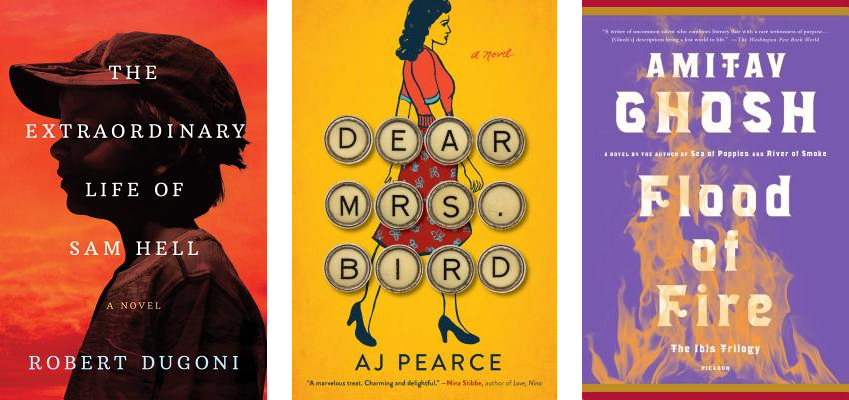
What are you reading now?
In June I went to hear a panel of writers speaking at the Bothell library. One of those writers was new to me, a Seattle writer named Robert Dugoni, and the librarian that presented him highly praised his new book, The Extraordinary Life of Sam Hell. It has taken a few months to get to it, but it is a most enjoyable read about an eye doctor who was born with red pupils and as a child was called “Devil Boy” by the other students. He muses on his life and choices and his relationship with two friends who were also outcasts.
What did you read last?
Dear Mrs. Bird, by AJ Pearce. It was a charming little novel about a young woman who has a menial job at a newspaper for a formidable boss. Placed in London during the blitz, I was a bit surprised by the scenes of people attempting to function normally in the nightly presence of bombs and those who valiantly worked among ruins to put out fires and locate survivors. The author’s wartime portrayal of London was fascinating, but I especially enjoyed the heroine’s going against her boss to secretly answer the letters to readers who ask for advice during those difficult times.
What are you reading next?
Another book in my “to read” pile is Flood of Fire by Amitav Ghosh. I long ago finished the first two books in his Ibis Trilogy, Sea of Poppies and River of Smoke. I read the second book while in Hong Kong visiting my daughter, which was particularly relevant because of the setting. The books deal with the trafficking of indentured servants and trade of opium in the 19th century and Ghosh has been short listed for several prizes for the trilogy.
Whatcha Reading, Laura Da'?
Every week we ask an interesting figure what they're digging into. Have ideas who we should reach out to? Let it fly: info@seattlereviewofbooks.com. Want to read more? Check out the archives.
Laura Da' is a Seattle-based poet and teacher. She is Eastern Shawnee. Da' has been both a Hugo House Fellow, and a Jack Straw Fellow, and is our Poet in Residence for November — you can find her poems linked from her bio page. The University of Arizona just released her second book of poems, Instruments of the True Measure.
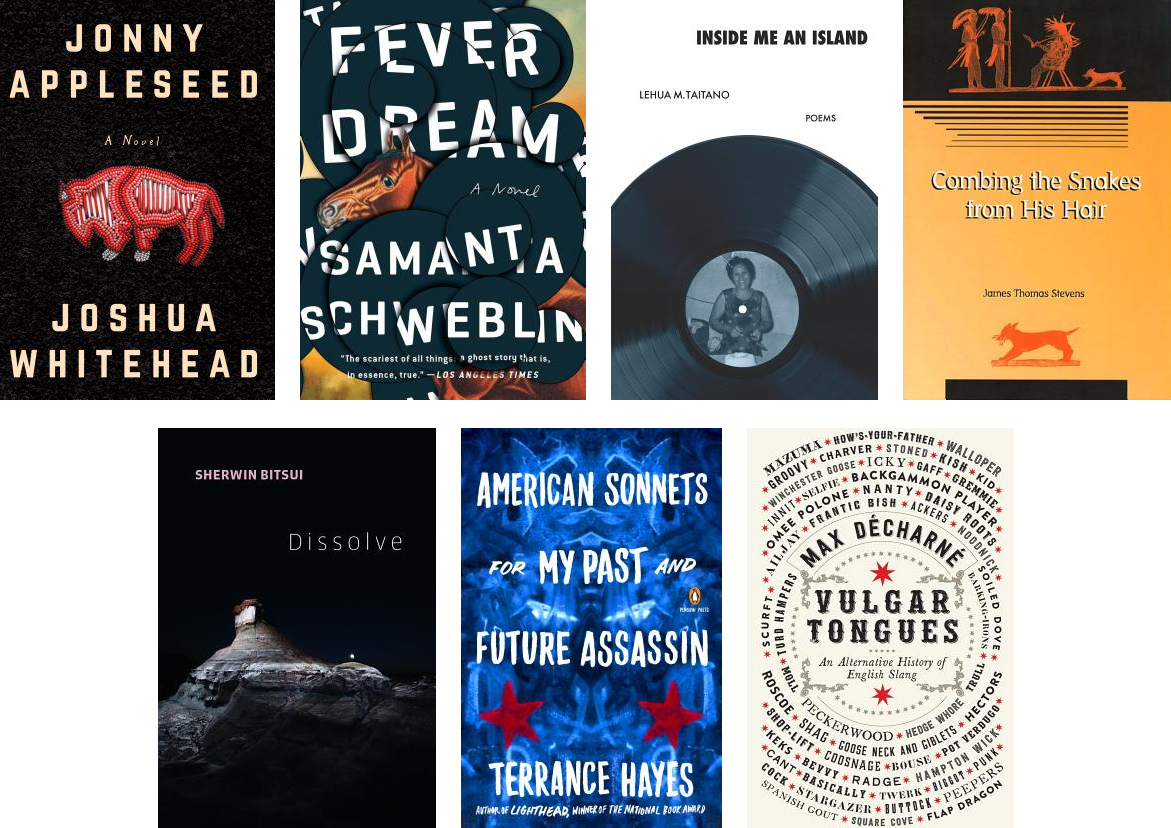
What are you reading now?
Right now I am reading Jonny Appleseed by Joshua Whitehead and Fever Dream by Samantha Schweblin. My best friend is a librarian who works the international circuit. She sends me books in translation from whatever country she is in and she just left Argentina last year and sent me Fever Dream. This book is tight, visceral, terrifyingly good, and also bluntly terrifying in its examination of environmental poison and alienation. I started Jonny Appleseed last night and it is so good I’m struggling to put it down. Whitehead is Peguis First Nation and Two-Spirit and from the first page, Jonny Appleseed is vibrant and pulsing with indigenous excellence.
What did you read last?
I just finished reading Inside Me an Island by Lehua Taitano. Taitano is a poet and interdisciplinary artist and that background informs their poetry with a ranging sense of the page’s whitespace and text movement; they are native Chamoru from Yigo, Guam, and this book examines diaspora with such skill and empathy. I was particularly moved by Taitano’s delicate use of correspondence in this collection. I’ve been re-reading Combing Snakes from His Hair by James Thomas Stevens. Stevens is one of my favorite poets and his long poem, Tokinish was one of the first things I read as a student at the Institute of American Indian Arts that made me want to write.
What are you reading next?
I’m about to read Dissolve by Sherwin Bitsui, American Sonnets for My Past and Future Assassin by Terrance Hayes, and Vulgar Tongues: An Alternative History of English Slang by Max Decharne. I’m a fool for any kind of popular non-fiction that breaks down language. I can’t wait to read Dissolve which is Bitsui’s third book and I expect that, like all of his work, it will be a new, unclassifiable, thrilling movement in poetry.
Whatcha Reading, Lesley Hazleton?
Every week we ask an interesting figure what they're digging into. Have ideas who we should reach out to? Let it fly: info@seattlereviewofbooks.com. Want to read more? Check out the archives.
Lesley Hazleton is a Seattle-based, British-born writer, journalist, and self-described "accidental theologian." Her latest book, Agnostic, A Spirited Manifesto, caused Paul Constant to do "something I have not done in a very long time: I flipped the book over, opened it, and then read the whole thing over again immediately". She'll be appearing next Thursday, the 15th, in conversation with Michael Hebb at the Elliott Bay Book Company.
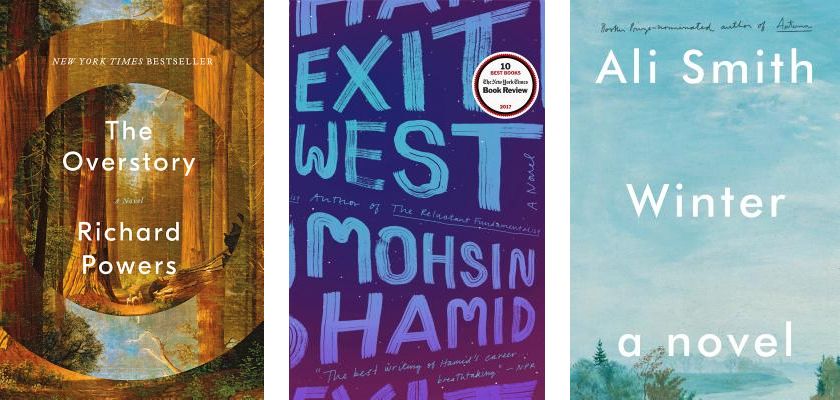
What are you reading now?
I was downtown on Vine Street recently, one of those blocks planted with puny urban specimens that will never be allowed to grow into full treedom. One had been cut down — diseased, I guess — and on the stump, a single word had been painted in white upper-case letters: BROKE. “Yes," I thought, "somebody else has read The Overstory.” For once, Richard Powers is not showing off how damn clever he is, maybe because he really cares about trees — and humans — and how they communicate (trees with trees, humans with trees, humans with humans). It's moved me to tears at times, and am already buying extra copies for friends. I’ll shelve it alongside Alan Weisman's The World Without Us.
What did you read last?
Mohsin Hamid’s Exit West. The third time I’ve read it — and I suspect not the last. I enjoyed the delicious mischief of The Reluctant Fundamentalist, but felt no need to read it again. This time, Hamid has dropped the irony, not least because the refugee crisis is way beyond that. In the kind of spare, pared-down prose that induces writer’s envy in me — hate to say it, but the word really is ‘crystalline’ — he pulls off a magic trick, making reality all the more tangible by inserting a deft touch of the surreal. And I don’t even need to buy copies for friends, because they’re already reading it.
What are you reading next?
Given the time of year, I'm ready for Ali Smith’s Winter. Because How To Be Both. And Artful. And There But For The. And anything she cares to write.
Whatcha Reading, Levi Fuller?
Every week we ask an interesting figure what they're digging into. Have ideas who we should reach out to? Let it fly: info@seattlereviewofbooks.com. Want to read more? Check out the archives.
Levi Fuller is a Seattle based musician, who plays in Levi Fuller & the Library, and The Luna Moth, and is the founder of Ball of Wax Audio Quarterly (of which he says that he's "really been meaning to come up with a tagline for like "the longest-running quarterly CD-R compilation series in Northwest Seattle" or something), and is the Administrative Coordinator at Jack Straw Cultural Center, where he manages their residency program for artists of all genres and disciplines and assists with daily operations. You can go see Levi Fuller & the Library on November 17 at the Blue Moon Tavern for their EP release party, and pick up the EP itself the new EP (which features a cover illustration from SRoB contributor Clare Johnson) on November 11th.
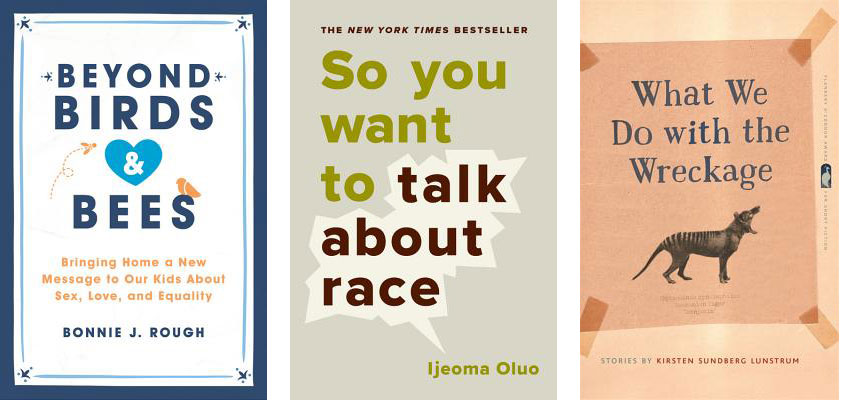
What are you reading now?
Right now I'm reading Beyond Birds & Bees, by Bonnie J Rough. It's a pretty new book that happens to be timed perfectly for me and my wife, as parents of a just-turned-three-year-old. It's filled with practical and thoughtful advice and ideas around raising kids with healthy outlooks on sexuality, their bodies, gender, etc. — you know, all that stuff we do so well in this country. I could not recommend it more strongly to anyone with a kid, the younger the better. As a generally liberal person who still has a lot of weird New England protestant hangups, it's eye- and mind-opening in the best ways.
What did you read last?
Before that I read Ijeoma Oluo's So You Want to Talk about Race, which has been on my list for a while. (I only noticed when I started the Rough book that they're both published under the same imprint — so shoutout to Seal Press for publishing some badass local women.) As a fan of Oluo's work and someone who's always looking for ways to be a less harmful version of a white man, I knew I wanted to read this the moment I heard about it, and it did not disappoint. Even for someone who pays attention to these issues and has gone through some anti-racism and racial equity training, there was still plenty to learn here. As much as all parents should read Bonnie Rough's book, all white people should read this one.
What are you reading next?
My "what's next" is often left up to whatever hold I forgot to reactivate at the Library, but right now I specifically want to go back to some fiction (but I will keep with the theme of badass local women). Kirsten Sundberg Lunstrum was working on her short story collection What We Do with the Wreckage when she was a Jack Straw Writer, and I enjoyed what I read and heard of it then, so I can't wait to read the whole collection.
Whatcha Reading, Priscilla Long?
Every week we ask an interesting figure what they're digging into. Have ideas on who we should reach out to? Let it fly: info@seattlereviewofbooks.com. Want to read more? Check out the archives.
Priscilla Long is a Seattle-based writer of poetry, creative nonfiction, science, fiction, and history, and a long-time independent teacher of writing (and yet, somehow, this list undersells her). The second edition of her wonderful The Writer's Portable Mentor: a Guide to Art, Craft, and the Writing Life is just being released by the University of New Mexico Press. She'll be appearing tonight at 7:00 pm to talk about this at the Elliott Bay Book Company.
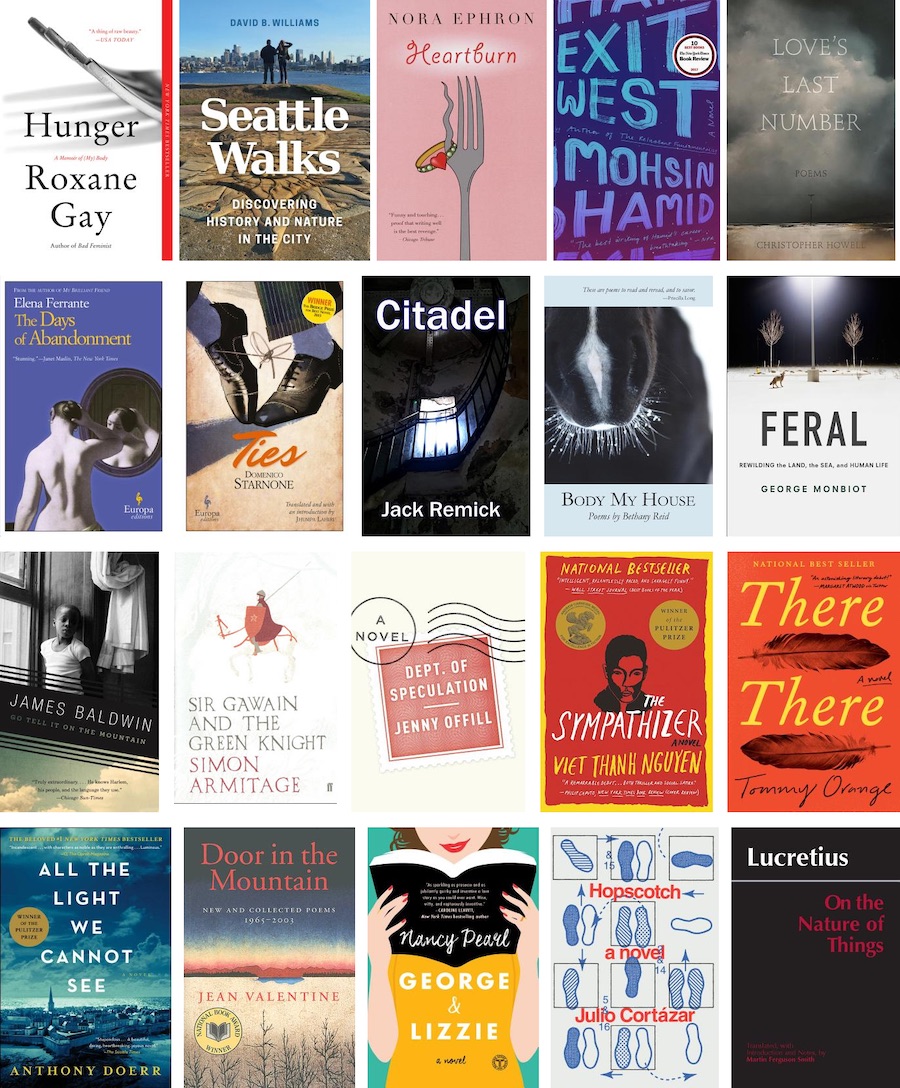
What are you reading now?
I read two, four, five books at once. I set the limit at five. I mean, really. Okay, so, now I am reading Roxane Gay's Hunger. Wow. Talk about #MeToo. And what a fantastic writer. What insight she brings to the subject of the body. What sentences she brings to the page. For poetry, Christopher Howell's Love's Last Number. Do we need to say one more thing about Howell's great poetry? I am still reading David B. Williams's Seattle Walks, walks that elucidate our history and geography, and believe it or not, I have walked all 17 walks. I will walk a few again. I thought I knew Seattle but learned something new on every walk. I am reading Exit West by Mohsin Hamid. A moving love story set in the violence and dislocation of the world as we know it.
What did you read last?
I've read a set of three novels about breakups, each one totally different and each one a great read. (No, I am not breaking up with anyone or anything.) Start with Heartburn by Nora Ephron, in which the narrator provides recipes, including that of the lime pie she puts in the face of her soon-to-be-former husband. Then The Days of Abandonment by Elena Ferrante. A beautiful thing. And third, Ties by Domenico Starnone, translated from the Italian by Jhumpa Lahiri. This family drama brings the word dysfunctional to new depths. I've just read my friend Jack Remick's Citadel, a powerful apocalyptic novel of the future in which women have had enough of the violence of men and have kicked them out (of the world). And then I read my friend Bethany Reid's new book of poems, Body My House (full disclosure: I wrote the foreword). They are wicked and delightful. For science, Feral: Rewilding the Land, the Sea, and Human Life by George Monbiot. A fascinating rethinking of ecological restoration. Finally I must mention The Sympathizer by Viet Thanh Nguyen. A great work of literature, if you ask me. The language! The story of three friends and the ways they get caught up in the long aftermath of the Vietnam War.
What are you reading next?
Oh my gosh. There There by Tommy Orange. And to complete the set on the dislocations of breaking up, Department of Speculation by Jenny Offill. I have yet to read All the Light We Cannot See by Anthony Doerr and it is sitting there on the pile, waiting, waiting. I am rereading James Baldwin; Go Tell It on the Mountain is next. I love to read one very old book every year. Last year it was Sir Gawain and the Green Knight translated from Middle English by Simon Armitage. This year I can't decide. On the Nature of Things by Lucretius? Maybe. Sitting there winking at me is Hopscotch by Julio Cortazar, a writer I adore. Also winking: 2666: A Novel by Roberto Bolaño, another writer I adore. Next will be George and Lizzie by Nancy Pearl. For poetry I have waiting for me Door in the Mountain: New and Collected Poems by Jean Valentine. I will stop here. I worry about the pile falling on my head and knocking me unconscious.
Whatcha Reading, Seattle Walk Report?
Every week we ask an interesting figure what they're digging into. Have ideas who we should reach out to? Let it fly: info@seattlereviewofbooks.com. Want to read more? Check out the archives.
Seattle Walk Report is a charming and delightful Instagram account run by an anonymous Seattlite. You can read Paul Constant's review with her, but here we dig into the most important question of all: when she's not walking or drawing, what is she reading? Special thanks to SRoB reader Josie who recommended we reach out to Seattle Walk Report. We love recommendations! Who do you want to hear from, here? Let us know.
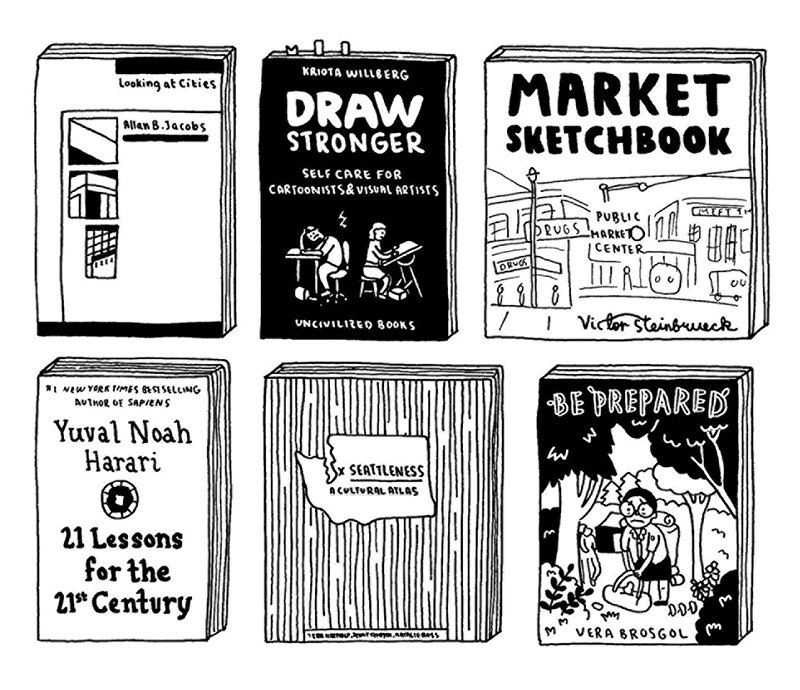
What are you reading now?
Due to a serendipitous library encounter, I'm currently reading Looking at Cities by Allan B Jacobs. It's about the crucial role of street-level observation in truly understanding the story of a city. Jacobs, an urban designer, delves into what you can learn about an area if you know what to look for and take the time to explore, and how that exploration can lead to building better cities. It was published in 1985 so some of the case studies in the book are a bit dated, but the essence and message of the book rings as true as ever. I'm really enjoying it so far.
After getting a totally preventable drawing injury, my friend gave me a lovely signed copy of a book called Draw Stronger: Self-Care for Cartoonists and Other Visual Artists by Kriota Willberg, which I've been reading and re-reading. The illustrations are laugh-out-loud funny at times and the writing is completely accessible. I highly recommend it.
What did you read last?
I'm 50 years late to the party, but I just finished pouring over Victor Steinbrueck's 1968 book Market Sketchbook about the Pike Place Market. It's phenomenal.
What are you reading next?
It's up for the Library hold system to decide, but I have a few that I'm especially looking forward to: 21 Lessons for the 21st Century by Yuval Harari, Seattleness: A Cultural Atlas by Tera Hatfield, Jenny Kempson, and Natalie Ross, and the graphic novel Be Prepared by Vera Brosgal. Middle grade graphic novels are a joy no one can take away from me!
Whatcha Reading, Ruth Dickey?
Every week we ask an interesting figure what they're digging into. Have ideas who we should reach out to? Let it fly: info@seattlereviewofbooks.com. Want to read more? Check out the archives.
Ruth Dickey is the Executive Director of Seattle Arts & Lectures, an avid reader, an ardent fan of independent bookstores, and an often-procrastinating writer. Fact: this column was largely inspired by receiving emails from Ruth, which include a signature that lists what she's reading, and it is always something compelling.
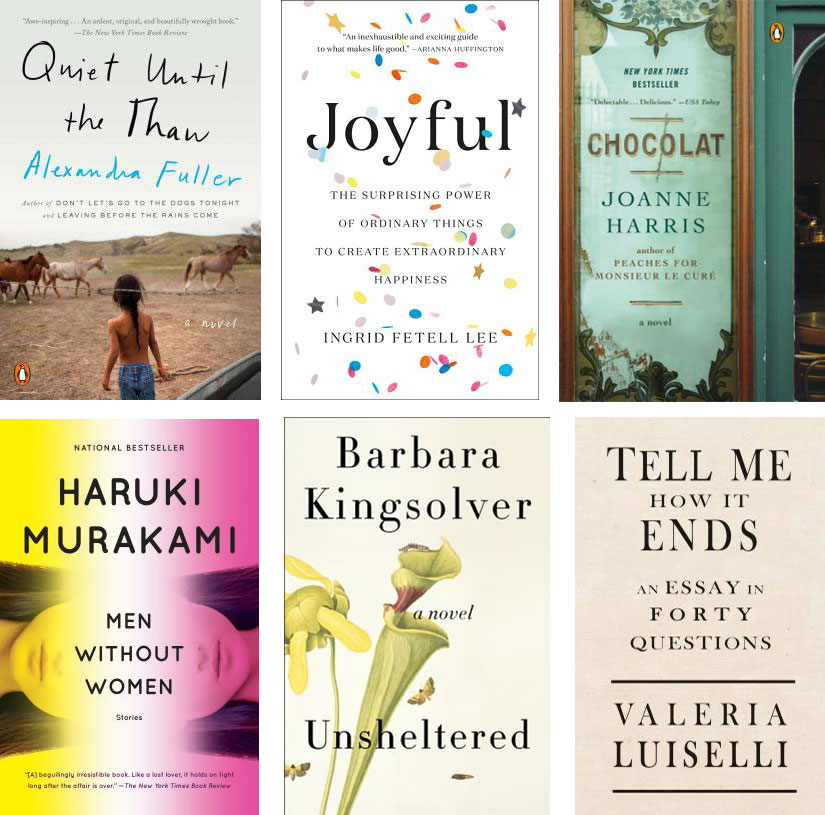
What are you reading now?
So allow me to begin with a confession: I usually have at least two books I'm reading at once, and sometimes an embarrassingly large stack. I think it's because the amount of things I want to read vastly outpaces what I can actually read. My current two I got in a bookstore at JFK (because a cross country flight without a book is tragic!): Alexandra Fuller's Quiet Until the Thaw, and Ingrid Fetell Less's Joyful: The Surprising Power of Ordinary Things to Create Extraordinary Happiness. I lost my mom five years ago this fall, and she loved Alexandra Fuller's work, so finding this pair of books felt like a special gift at a time when I was particularly thinking of my mom and loss and the funny ways that grief moves through us.
What did you read last?
This summer I had the great gift of walking a chunk of the Northern Route of the Camino de Santiago in Spain, and the last two books I read were both ones I found at the end of my journey: Joanne Harris' Chocolat (in a pizza place in Arzua) and Haruki Murakami's Men Without Women (in a bookstore in Madrid). I love how often books show up in our lives at times we need them, and Harris' story of the triumph of love and compassion over rule and dogma combined with Murakami's haunting stories of people finding their way and the image of a moon made of ice somehow felt like the perfect combination to carry me home.
What are you reading next?
Barbara Kingsolver's new novel, Unsheltered. I absolutely adore Barbara Kingsolver's work, and am looking forward to her new novel and her visit to SAL on October 25th (it's sold out, but we'll be selling standby at the door!). And next in line is another upcoming SAL author I really admire, Valeria Luiselli. I'm looking forward to reading Tell Me How It Ends: An Essay in 40 Questions, and to having her at SAL April 17, 2019. Both of these authors tackle issues of justice and compassion and our complicated world in such thoughtful and insightful ways — a perfect balm for these times.
Whatcha Reading, EJ Koh?
Every week we ask an interesting figure what they're digging into. Have ideas who we should reach out to? Let it fly: info@seattlereviewofbooks.com. Want to read more? Check out the archives.
EJ Koh is the author of A Lesser Love, winner of the Pleiades Editors Prize, and her memoir The Magical Language of Others forthcoming from Tin House. Her poems and translations have appeared in Boston Review, Columbia Review, Los Angeles Review of Books, PEN America, World Literature Today, and of course, here on the Seattle Review of Books. She has accepted fellowships from The American Literary Translators Association, Kundiman, and The MacDowell Colony.
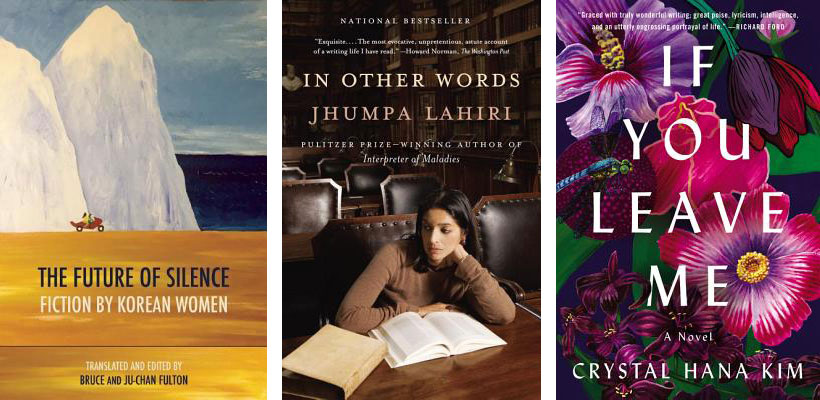
What are you reading now?
A collection of fiction by Korean women The Future of Silence translated by Bruce and Ju-Chan Fulton. It’s one of very few collections of Korean writing in the English-speaking world. Stories like O Chong-hui’s “Wayfarer” and Park Wan-so’s “Identical Apartments” make noises in my heart, noises I've never heard. One of my favorites, So Young-un’s “Dear Distant Love,” with its repressed, reclaimed visuality and story is darkly moving.
What did you read last?
After Jhumpa Lahiri published her self-reflections in the Italian language, I picked up the English translation In Other Words. The possibility of a new language giving birth to a new voice is both familiar and startling. I ask myself these same questions: Could I write a story in the Korean language? Would I dare to write a poem in the Japanese language? How does this change my writing, the place from which I speak?
What are you reading next?
I will begin Crystal Hana Kim’s If You Leave Me. It’s a debut that tackles the birth of modern Korea, beginning at the refugee camps and through the aftermath of war. I’m looking forward to experiencing the characters, the intimate story, but especially the lessons.
Whatcha Reading, Stesha Brandon?
Every week we ask an interesting figure what they're digging into. Have ideas who we should reach out to? Let it fly: info@seattlereviewofbooks.com. Want to read more? Check out the archives.
Stesha Brandon is a wonder. Formerly of Town Hall Seattle and University Book Store, Stesha is currently the Literature & Humanities Program Manager at Seattle Public Library, and serves as board president at Seattle City of Literature. Other volunteer service includes the Bumbershoot Task Force, the Washington State Book Awards jury. When she's not reading, Stesha keeps chickens, knits, and bakes tasty treats. On that last point, a point of editorializing: if you've been the beneficiary of Stesha's baked goods, you understand just how much "tasty treats" is totally underselling her absolutely divine pastries.
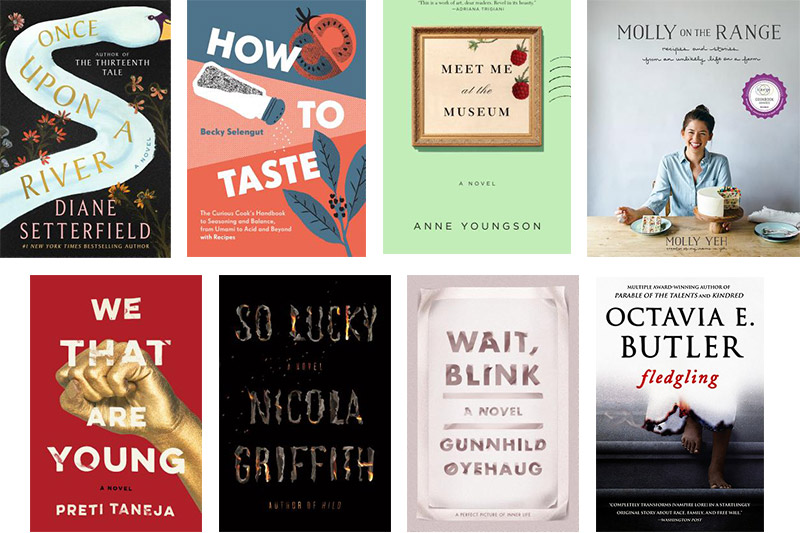
What are you reading now?
I’m finishing up Diane Setterfield’s forthcoming book, Once Upon a River. It’s eerie and atmospheric and feels a little like a fairy tale. The story centers on a young girl who may have been drowned, and then comes back to life. It doesn’t come out until December, but it feels perfect for a fall/winter read.
I’m also reading local chef and author Becky Selengut’s newest book How to Taste, which is super interesting. It talks about how our taste functions and has experiments/recipes so the reader can experience firsthand what Becky is talking about.
What did you read last?
I just finished listening to Meet Me at the Museum, which is an epistolary novel of two letter writers, one in England and one in Denmark, and how their connection shapes their lives.
And anyone who knows me knows that I read cookbooks like novels. I just finished Molly on the Range, by Molly Yeh. It has a wide array of recipes that highlight that she’s a city transplant into Midwest farm life.
What are you reading next?
This list is always long and gets longer by the day! I’ve got a big stack of books waiting, but I’m excited to read We That Are Young by Preti Taneja. It’s a resetting of King Lear in contemporary India. I’m also looking forward to reading Nicola Griffith’s So Lucky. Nicola is one of the most interesting people writing these days, and I can’t wait to dive into her newest book. I’ve also just checked out Wait, Blink by Gunnhild Øyehaug — a Norwegian novel on the longlist for the National Book Award in Translation and Fledgling by Octavia Butler. I’ve read several of her books, but somehow never got to this one.
Whatcha Reading, Somaiya Daud?
Every week we ask an interesting figure what they're digging into. Have ideas who we should reach out to? Let it fly: info@seattlereviewofbooks.com. Want to read more? Check out the archives.
Somaiya Daud is a Seattle-based writer and PhD student. Her first novel, Mirage, was just released in August by Flatiron Books. She'll be appearing at the Portland Book Festival in November, which by itself is a great reason to plan a trip south, but with Daud appearing, you can go and cheer on Seattle talent while living your best PDX life. Sounds like a great little getaway!
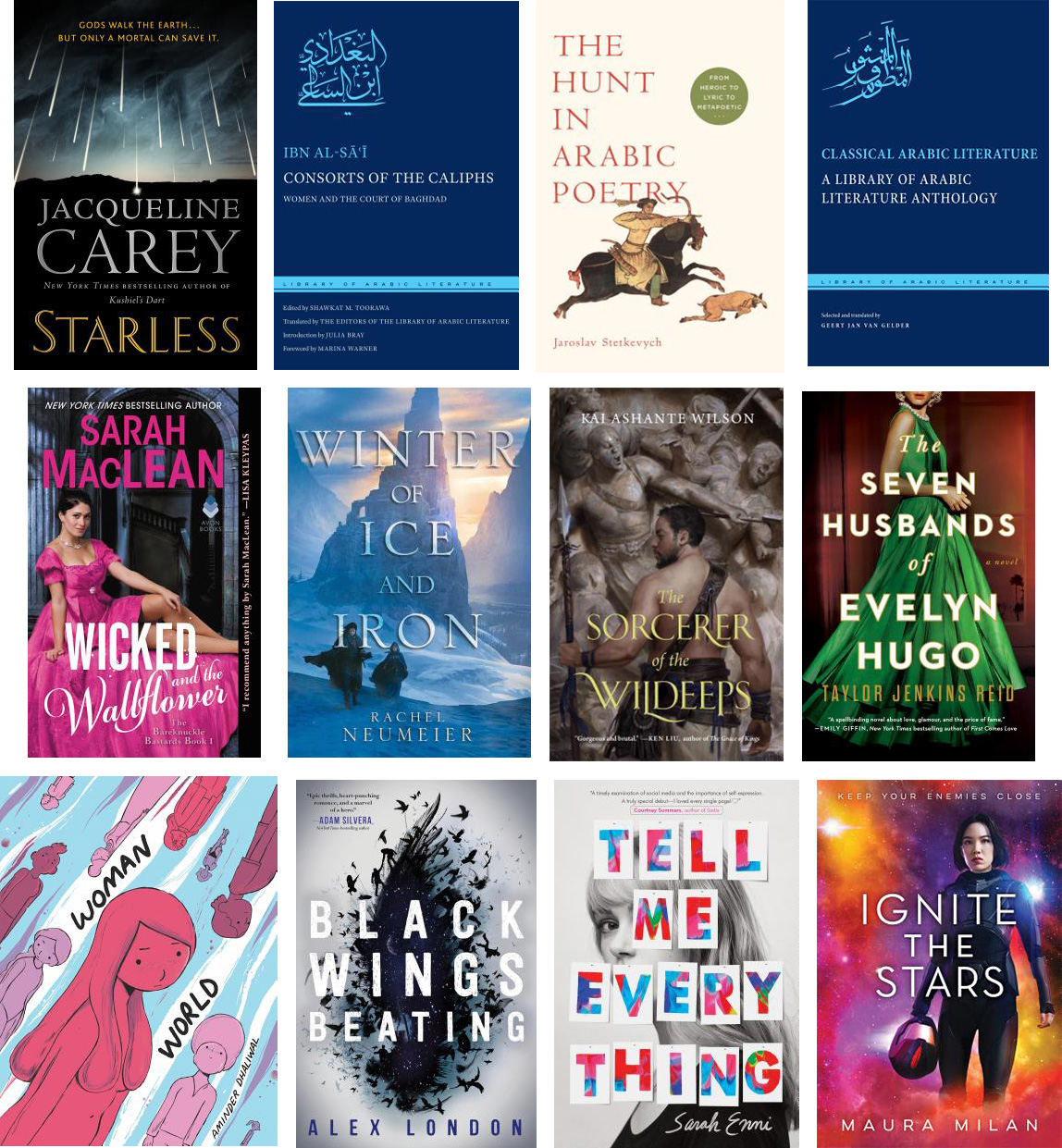
What are you reading now?
I have been in the mood for a lush, sprawling fantasy so I just checked out Jacqueline Carey's Starless and I keep starting then pausing my re-read of her older Kushiel books. I'm also doing a lot of research reading for the second Mirage book and that includes Consorts of the Caliphs by Ibn al-Sa'i, The Hunt in Arabic Poetry by Jaroslav Stetkevych, and selections from Classical Arabic Literature, a curation put together by Geert Jan Van Gelder.
What did you read last?
I just wrapped up Sarah Maclean's Wicked and the Wallflower, and finished a reread of Rachel Neumier's Winter of Ice and Iron.
What are you reading next?
I have quite the stack! I'm planning on rereading Sorcerer of the Wildeeps by Kai Ashante Wilson! My new reads stack is currently sitting in my living room and includes: The Seven Husbands of Evelyn Hugo by Taylor Jenkins Reid, Woman World by Aminder Dhaliwal (I have been excited for this for a while!), Black Wings Beating by Alexander London, Tell Me Everything by Sarah Enni, and How to Write an Autobiographical Novel by Alexander Chee. Oh! And Ignite the Stars by Maura Milan (if my library would bump me to the front of the line, please and thank you!).
Whatcha Reading, Deb Caletti?
Every week we ask an interesting figure what they're digging into. Have ideas who we should reach out to? Let it fly: info@seattlereviewofbooks.com. Want to read more? Check out the archives.
Deb Caletti is a Seattle-based author, and National Book Award finalist. She won the Washington State Book award for Honey, Baby Sweetheart, which is just one of her fifteen YA and adult novels. Her latest is the YA novel A Heart in a Body in the World. You can see her talk about it in conversation with Martha Brockenbrough next Thursday, September 20th, at University Bookstore, and at the Lake Forest Park Third Place Books, on Saturday the 22nd.
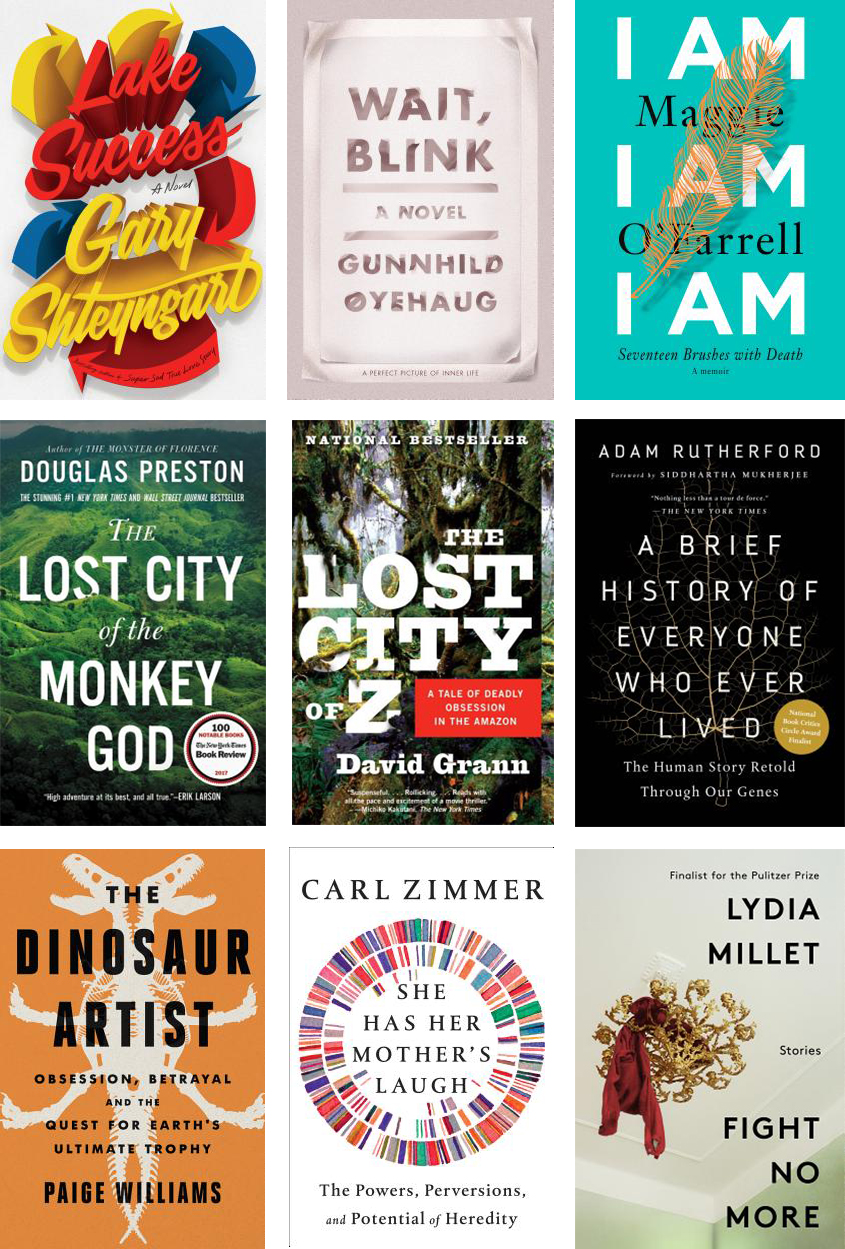
What are you reading now?
I’m reading Gary Shteyngart’s Lake Success. When I saw the review copy at BEA, I knew I had to have it, because I really liked Little Failure. At that point, I’d already gone past the number of books I could reasonably fit in my bag, but we are so greedy, us book lovers. It wasn’t quite the straw that broke the author’s back, but it was the ARC that literally broke the suitcase. I walked around two airports with the handle of my bag stuck halfway up, thanks to Lake Success, but it’s been worth it so far. Shteyngart’s so great at small moments of insight, and unexpected details that are surprisingly funny or vivid or poignant. He’s a compassionate writer, and I always love that. ou feel like it’s you and Gary there together in the crazy world of humans, and you’re better for it.
What did you read last?
I just finished by Wait, Blink, by Gunnhild Øyehaug. It’s a charming, odd, yet quietly profound novel of connected stories. I loved it. I was really happy to see it this week on the National Book Award’s inaugural longlist for translated literature. I also recently finished I am, I am, I am, by Maggie O’Farrell. Its subtitle is Seventeen Brushes with Death, and each chapter heading is labeled with the part of the body (lungs, heart, neck, etc.) related to the experience. I always know I’m in good hands as a reader when a book makes me want to write, and this one did that. It’s honest and intimate without feeling confessional, and the writing is beautiful in parts.
What are you reading next?
After I read The Lost City of the Monkey God, by Douglas Preston, I was so crazy about it that I read The Lost City of Z (David Grann), and then A Brief History of Everyone Who Ever Lived, by Adam Rutherford. Now, Sapiens, by Yuval Noah Harari is up next, as well as The Dinosaur Artist, by Paige Williams, and She Has Her Mother’s Laugh: The Power, Perversions, and Potential of Heredity, by Carl Zimmer. When I emerge from the deep jungle of history-plus-science, Lydia Millet will be waiting for me in the daylight of today, with Fight No More, her newest book of stories, which are all connected through a central character — a lonely Los Angeles real estate broker.
Whatcha Reading, Maria Dahvana Headley?
Every week we ask an interesting figure what they're digging into. Have ideas who we should reach out to? Let it fly: info@seattlereviewofbooks.com. Want to read more? Check out the archives.
Maria Dahvana Headley, is an author, editor, playwright, screenwriter, and monstermaker — to quote her website. She's a bestselling author of the YA space fantasy Magonia, and most recently, The Mere Wife which re-imagines Beowulf in the modern age. She once called Seattle home, but now writes from new York.
A night not to miss: this Monday, September 10th, Nicola Griffith will be interviewing Maria Dahvana Headley in the Microsoft Audtiorium at the central library, a joint production of the Seattle Public Library, and the Elliott Bay Bookstore. Starts at 7:00pm.
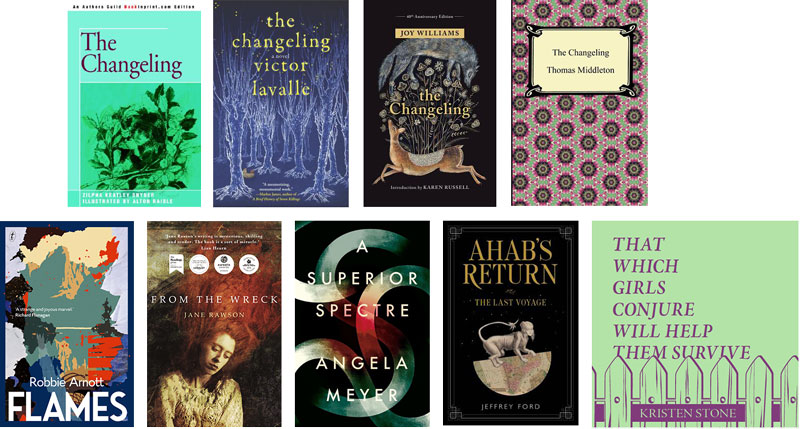
What are you reading now?
Sometime in recent months, I discovered that I had four books called The Changeling on my shelves, which tells you something about the kind of person I am. I'm definitely not a changeling — I actually come from a weirdo magic family, and was never trapped among Muggles — but the moment I learned the term, age 8 or so, I was like...OMFG LEMME BE A FAIRYLAND PROBLEM CHILD. I learned about changelings from the Zilpha Keatley Snyder novel (1970), which is actually about class, creativity and friendship between girls, but which deals in the story of an artistic, brilliant, and very poverty-stricken girl who believes she came from the fairies rather than from her own family. I loved Snyder's books because they were about people like me, wandering around rather below the working class, rather than about children who came from money, manses, and well, WWII-era England, however perilous. I was interested in the longform peril of poverty and daily life. Snyder's work was all rooted in imaginative games, and I'm currently also reading this badass academic paper by Cathlena Martin, about how Snyder's The Egypt Game as well as other children's lit preceded and plausibly influenced Dungeons & Dragons and other role-playing games (which are usually credited to influencers like Tolkien). So, back to Changelings, various versions: Last year, I read Victor LaValle's brilliant novel version in which a couple deals with a horrific and agonizing child-swap. And now, right now, I'm reading Joy Williams's The Changeling for the first time, though I've been a fan of Williams's work for years, beginning with The Quick & the Dead, another book about fiery, difficult, magical friendships between girls. Williams's Changeling is thoroughly my kind of book — the kind that can't be compared to anything, but hey, say, Malcolm Lowry mashed with the surrealist eerie (surreeriealist?) plots of Shirley Jackson. In it, a floatingly aimless mystic of a young woman falls into a strange as fuck clan mostly made of children, but run by an abusive man. Williams is killingly precise and poetic, and each sentence makes me suffer, because each paragraph made of these sentences is basically a novel unto itself. For example: "...after the first (child), Aaron truly believed himself to be a sinful man. He invented the Devil for them then. Emma didn't care. She had always been below good and evil. Her magic had never been anything trivial. No burying of teeth or hair. No communions of blood and excretions. If Aaron chose to believe in something as trivial as the Devil, Emma allowed him his foolishness." This is in a recounting of the child tribe's story of their origins. The particularity of it! The simplicity of it — below good and evil! — and a couple of pages later? "It was Emma that seemed to have an excellent relationship with God. They were like two bears in the same den. Dismissing faith, Aaron took up with superstition." Ahhhh, I'm dead. It's like a four paragraph dissertation on the labyrinthine ways of toxic masculinity. I have to read this book in short bursts. Right now, I'm halfway through, and panting. The last Changeling on my shelf is Thomas Middleton's play from the 1600's, but apparently I could also read some Ōe. I'll no doubt one day give in and write a changeling story of my own. If you let a story concept gestate for 33 years, you know you have to surrender and give it to the fairies. Fine, fine, I'll give birth to this story. Oh, uh-oh, what is this in the cradle?...Welp.
I mean, that's what this whole profession looks like from the inside.
What did you read last?
Last book I read was in Australia, because I was at the Melbourne Writers Festival, and during it, I slunk into several bookstores ostensibly to sign my own books, but really to paw at books I hadn't yet seen in the US. So, on the flight back to the US a few days ago, I read three in a row, and they had things in common, and I was excited! Beyond the Wreck, by Jane Rawson, is intensely researched historical fiction but also has a cephalopod shapeshifting alien, so. SO, it's remarkable. It's got many different POVs and a whole lot of weird, but the weird is firmly rooted in the difficulties of having a mortal body, and conversely in the difficulties of being a wandering lonely creature whose body doesn't work out well on our planet. It's dark and beautiful, and puzzling and unresolved, and I was way into it. Then, I read Flames by Robbie Arnott, which begins with a family of women resurrecting post-cremation and living on for a few days in human/botanical hybrid format, and takes us on a wander through a world in which tuna fishing is done only by fishers who've bonded with seals, fire is a father, and love of creatures and landscapes is a motivating force. Then I read A Superior Spectre, by Angela Meyer, which is a dual/linked timeline story about a near-future dying man from Australia who uses a device to connect his mind to the life and mind of a young woman in 1860's Scotland. He ends up haunting her, but this book is complicated and intriguing in a host of ways, not least because of the way it deals with sexuality, ethical responsibility, and again, toxic masculinity. All these books had in common the notion of melding one's consciousness with the consciousness of someone else, whether human, creature, or alien, and also the notion of time being a fluid concept. They were also all page-turners, however unlikely that sounds. And man, they all made me cry. Cool shit is afoot in Australian lit.
What are you reading next?
I don't have this book yet, because it's not out yet, but I'm coveting Elizabeth Hand's Curious Toys, which I've been coveting ever since I heard about it. It's a novel about Henry Darger, and Liz's work is always erudite, elegant, and scathing. I'm also coveting Jeff Ford's Ahab's Return, which is a Moby Dick riff in which Ahab washes up in a Manhattan full of deep story -—Jeff manages to work in language that often seems domesticated but lands in you like a thing with long claws. And ooh, also That Which Girls Conjure Will Help Them Survive, by Kristen Stone. My friend Sarah McCarry's chapbook series Guillotine is impeccable, always, and this novel is about several generations of building a family, and surviving the inheritance of trauma.
Whatcha Reading, Kelly Froh?
Every week we ask an interesting figure what they're digging into. Have ideas who we should reach out to? Let it fly: info@seattlereviewofbooks.com. Want to read more? Check out the archives.
Something slightly different this week! We're breaking the question-answer format to make room for some badass comic reviewing:
Kelly Froh is the Executive Director of Short Run Comix & Arts Festival. This year’s fest takes place on Saturday, Nov. 3rd at Fisher Pavilion at Seattle Center. She is also a comic artist, and sometimes, after all the dishes are done, and she’s read all the comics she bought, works on her own books.
Fruit of Knowledge by Liv Strömquist (Fantagraphics, 2018)
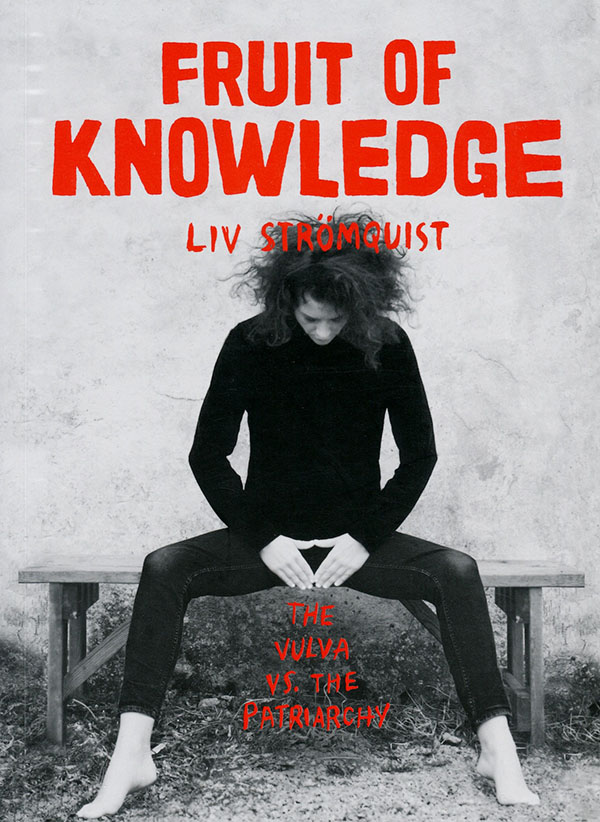
Um. I’m 44 and I learned things about my own body in this book. Strömquist provides some pretty intense research that charts not only women’s inequality (with focus on how the studying and writing about our sex organs has changed over time in order to fit Christian ideals or freakish academic interest) but also the shoddy science behind gender binaries, and the longest, most accepted myth that conveniently sells women a lot of f-ing products. Her comics make the outrage from the information in this book a bit easier to take, sort-of, I had read it in 3 sessions.
Nausea by Abraham Díaz (Kus!, 2018)

(I ordered this book from Seite Books in LA — perhaps the greatest curated selection of zines & comics I have ever seen — but Fantagraphics Bookstore in Georgetown may carry it as well!)
Three people’s nights run parallel in gritty Mexico City. Sex, drugs, and plenty of crime, this comic hits all marks. All 3 stories end worse than you can ever imagine. I love this artist’s rough drawing style so much, it’s so refreshing in contrast to the soft and fluffy stuff that is popular right now.
PP 911! by Julia K (Cold Cube Press, 2018)
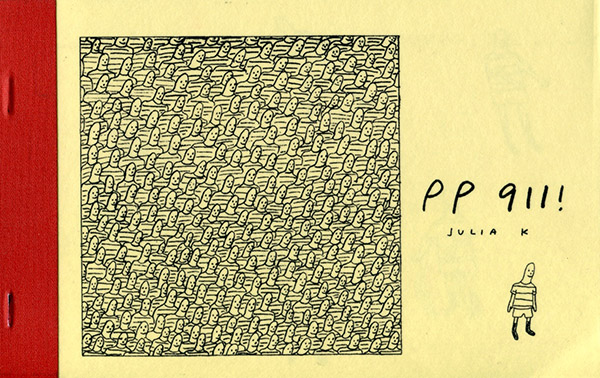
Who is this little person? Is it Julia K? Her subconscious? I really got a kick out of their quick thoughts in these short strips and single images. “Intimacy issues? Schmintimacy schissues!”
Crystal Bone Drive by Tetsunori Tawaraya (Hollow Press, 2017)
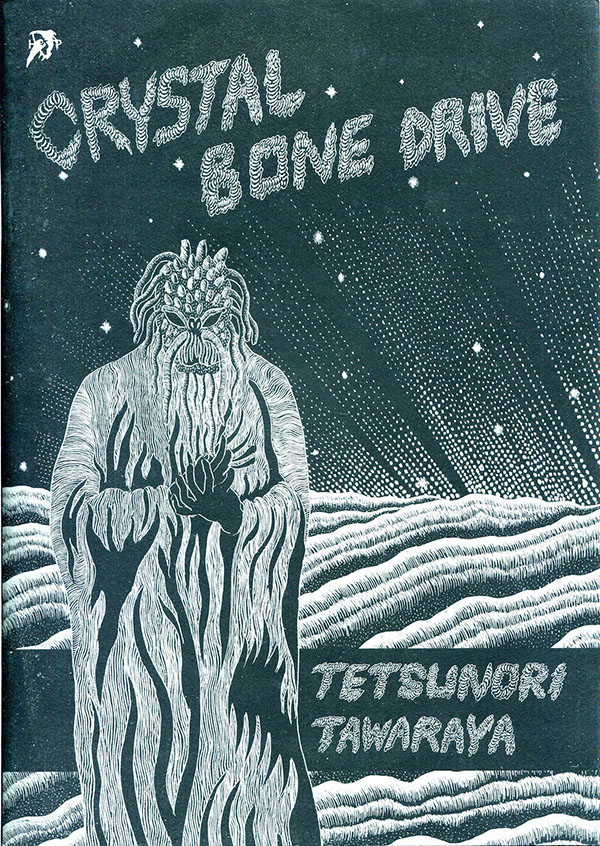
(I ordered this book from Seite Books in LA)
Ok, I admit I have no idea what the story is here (maybe like, a space adventure, with warring creatures?), but I have looked at this book 10 times because the art is done on black scratch board and printed in silver ink. It’s a beautiful book, Tawaraya’s lines are thin and perfect, you can get lost in them and forget to look at the larger image on the page. What a feat too, I mean, you can’t erase scratchboard. If you mess up you’d have to start over!
Whatcha Reading, Sharma Shields?
Every week we ask an interesting figure what they're digging into. Have ideas who we should reach out to? Let it fly: info@seattlereviewofbooks.com. Want to read more? Check out the archives.
Sharma Shields is a Spokane-based novelist and short story writer. Her latest, The Sasquatch Hunter's Almanac won the 2016 Washington State Book Award in Fiction. Her short story collection Favorite Monster was published in 2012. And, soon to come: The Cassandra, a novel set in Hanford in the 1940s, coming in February of next year. It looks amazing — it would be a fantastic idea to pre-order your copy now!
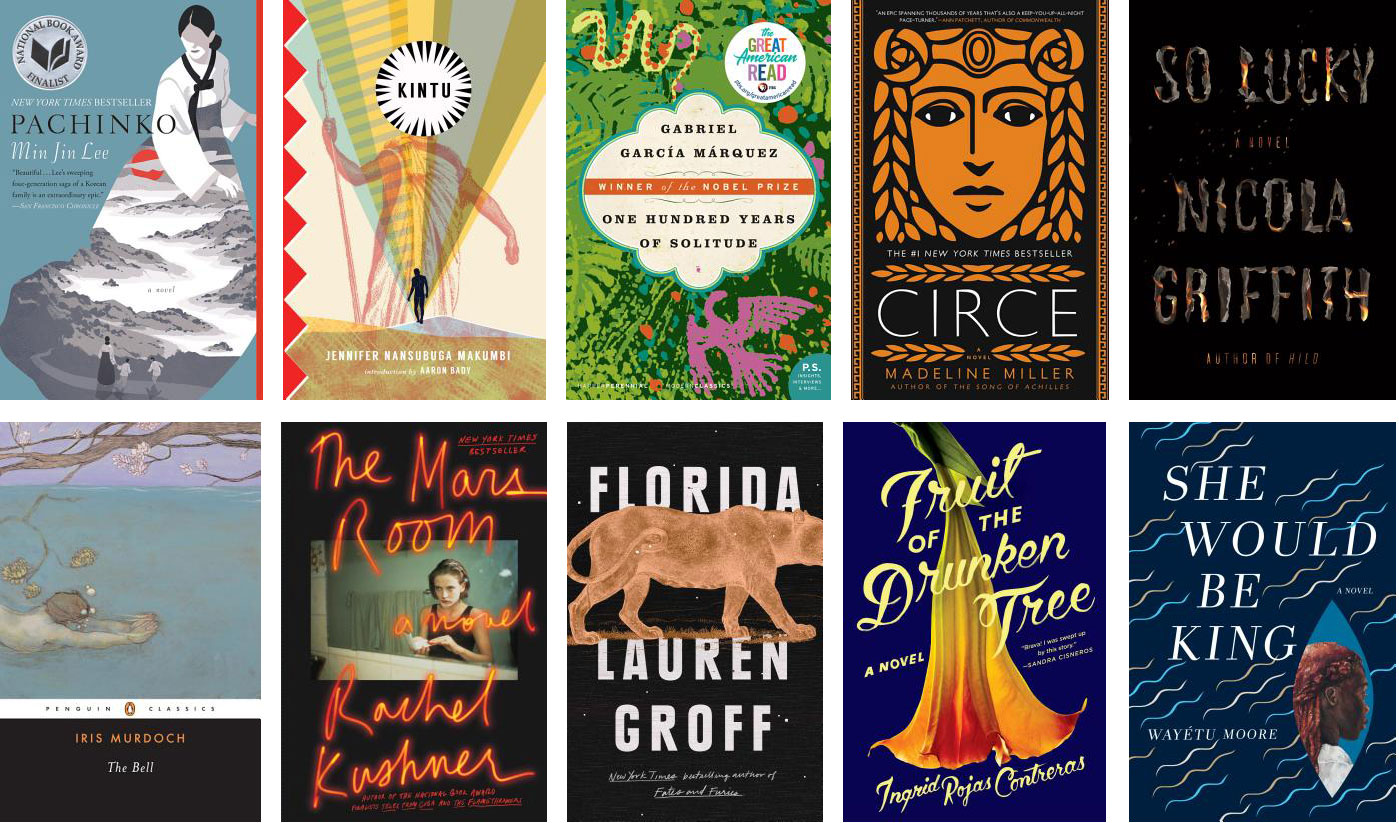
What are you reading now?
Pachinko by Min Lin Jee, a toothsome, engrossing, moving addition to the family epic, a category of literature I adore that includes Kintu by Jennifer Nansubuga Makumbi and One Hundred Years of Solitude by Gabriel García Márquez.
What did you read last?
- Circe by Madeline Miller — such a Greek myth pleasure bomb. The scene where Circe first turns men into pigs is awesomely, satisfyingly rendered.
- So Lucky by Nicola Griffith, a kickass novel about the monster of multiple sclerosis; this was an intimate, difficult, and ultimately bracing read for me given my own struggles with MS. Also — damn! — Griffith writes the most gorgeous sentences. Excited to read Hild, too.
- The Bell by Iris Murdoch. Murdoch never hesitates to straight-up imperil her characters. I relate so much to their vulnerability.
What are you reading next?
The Mars Room by Rachel Kushner, Florida by Lauren Groff. I've also placed on hold Fruit of the Drunken Tree by Ingrid Rojas Contreras and She Would Be King by Wayétu Moore (both will be published this fall).
Whatcha Reading, Jessica Mooney?
Every week we ask an interesting figure what they're digging into. Have ideas who we should reach out to? Let it fly: info@seattlereviewofbooks.com. Want to read more? Check out the archives.
Jessica Mooney is a Seattle-based writer. Her criticism, essays, and short stories have appeared in Vol. 1 Brooklyn, The Rumpus, Salon, City Arts Magazine, and of course here, where she reviewed, Kristen Radtke's Imagine Wanting Only This, and Leni Zumas' Red Clocks. Jessica's story "Love Canal" was one of the first pieces of fiction we published. That's not even talking about her non-literary career, in the field of global health for an international nonprofit; her scientific research has been published in Prevention Science and the Journal for Health Disparities Research and Practice. She's received grants from the Seattle Office of Arts and Culture and 4 Culture, and was a previous Made at Hugo House fellow.
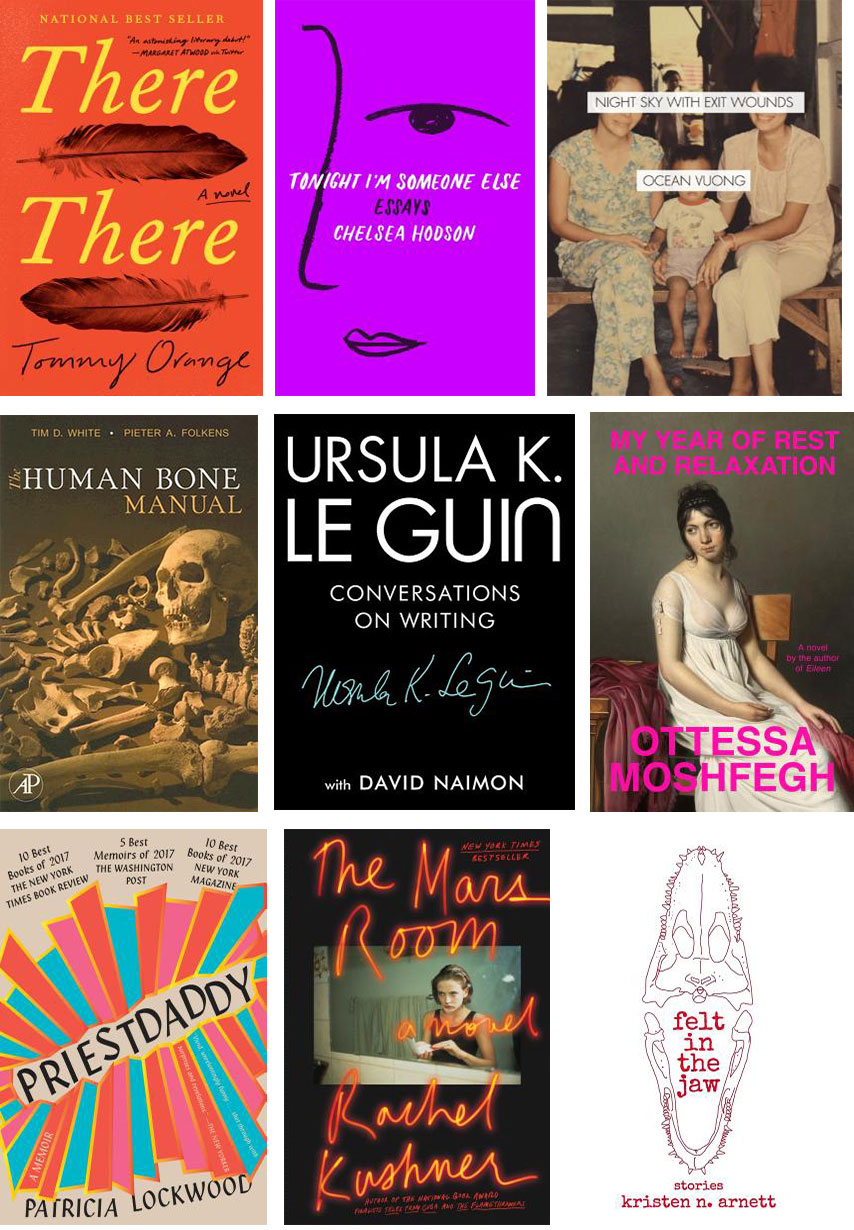
What are you reading now?
I always have a few books going in rotation. Right now it's There There by Tommy Orange, who is not only an incredibly gifted writer, but a kind human being; Tonight I'm Someone Else by Chelsea Hodson; and I finally picked up Ocean Vuong's Night Sky with Exit Wounds. I'm also reading the Human Bone Manual as research for a novel (great summertime creepy read!), and a few Oliver Sacks essays, which I've done every August the past fseveral years to commemorate his death — "My Periodic Table" just crushes me every time I read it.
What did you read last?
After hearing David Naimon interview Urusla K. Le Guin on on his (very excellent) podcast "Between the Covers", I picked up Conversations on Writing from Tin House Books. I also just finished reading Ottessa Moshfegh's My Year of Rest and Relaxation and Patricia Lockwood's Priestdaddy, both of which I highly recommend for their brilliant off-kilter prose and straight-for-the-jugular humor.
What are you reading next?
Looking forward to Rachel Kushner's Mars Room, Hanif Abdurraqib's They Can't Kill Us Until They Kill Us, and I just ordered Kristen Arnett's Felt in the Jaw, which I can't wait to read with a bottle of BOGO wine, purchased from 7-Eleven, of course, as the good author intended.
Whatcha Reading, Kamari Bright?
Every week we ask an interesting figure what they're digging into. Have ideas who we should reach out to? Let it fly: info@seattlereviewofbooks.com. Want to read more? Check out the archives.
Kamari Bright is a poet, filmmaker, artist, and musician, who also happened to be our Poet in Residence for July. See the five poems we published: Chalice, And the Moon, Nephilim, The Garden, Eve, and our interview. She'll be appearing at the 3rd Seattle Urban Book Expo, on August 25th.
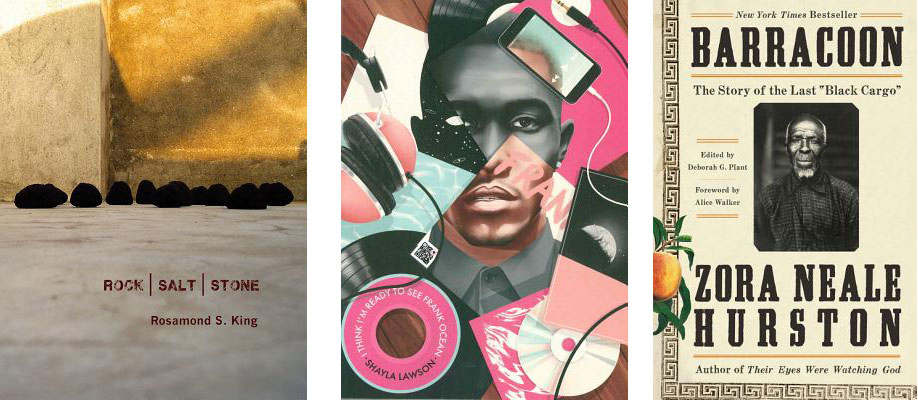
What are you reading now?
Rock | Salt | Stone by Rosamond S King
What did you read last?
I Think I'm Ready to See Frank Ocean by Shayla Lawson
What are you reading next?
(Hopefully) Barracoon by Zora Neale Hurston
Whatcha Reading, Austin Woerner?
Every week we ask an interesting figure what they're digging into. Have ideas who we should reach out to? Let it fly: info@seattlereviewofbooks.com. Want to read more? Check out the archives.
Austin Woerner is a Chinese-English literary translator. In addition to Su Wei's novel The Invisible Valley, just out from Small Beer Press, he has translated two volumes of poetry, Doubled Shadows: Selected Poetry of Ouyang Jianghe, and Ouyang Jianghe's book-length poem Phoenix. Formerly the English translation editor for the innovative Chinese literary journal Chutzpah!, he also co-edited the short fiction anthology Chutzpah!: New Voices from China. He holds a BA in East Asian Studies from Yale and an MFA in creative writing from the New School, and is currently a lecturer at Duke Kunshan University just outside of Shanghai. He's appearing tonight at Elliott Bay Books to talk about The Invisible Valley.

What are you reading now?
I've been rereading Waiting by Ha Jin. While I was translating The Invisible Valley I actually steered away from fiction set in China, because I wanted to develop my own ear for how to evoke a Chinese cultural setting in English. (I guess you could call it "reinventing the wheel.") But now that I actually live in China, I'm more and more fascinated by Chinese emigrant writers like Ha Jin and Yiyun Li, who write in English about experiences they had back in China in more or less the same time period as The Invisible Valley is set. (And in such beautiful English! As an EFL writing teacher I'm in awe of people who develop a fine literary style in a foreign language.)
What I like about Waiting is the way its main characters feel so real, their emotions so relatable, despite the fact that their culture and life circumstances are so vastly different from the novel's intended readers. At the same time, living in China has given me an appreciation for certain dimensions of their experience I wouldn't have understood well before. Back in the Maoist era people had such little latitude to make decisions about their own lives. So the story's drama takes place in the tiny range of motion available to them. Obviously things've changed a lot since then, but some things still resonate.
What did you read last?
Over the past year I've been dipping in and out of Jonathan Spence's Return to Dragon Mountain. Spence recreates in novelistic detail the life and times of Zhang Dai, a Ming-dynasty aesthete and man of leisure known for his gem-like prose essays. Zhang's world is the that of the "scholar gentry" of the lower Yangtze delta, a privileged elite who passed their days in painting, poetry, tea connoisseurship, and other charmingly frivolous-seeming hobbies. Zhang famously said, "A man with no excesses is not worth befriending," and Spence conjures Zhang's character through his obsessions: finding the perfect springwater to brew the perfect cup of tea, directing amateur operas, inventing witty taxonomies to categorize the different kinds of people who go boating on West Lake in Hangzhou, and so forth.
Though it's easy to laugh off Zhang's pastimes as the dissipations of a silk-slippered aristocrat, it's not hard to see parallels to our contemporary era of abundance. When your basic needs are already amply met, what do you do with your time to give meaning to your life? (Later, when the Ming dynasty fell, his family would lose everything, and that foreknowledge lends his reminiscences the air of an elegy for a lost world.) The area where I now live and teach is more or less Zhang's home turf, and though the freeways and freight barges and endless factories of the modern-day Yangtze delta are a far cry from Zhang's pleasure boats and gardens, I feel like Zhang's spirit hovers over them still.
What are you reading next?
This summer, taking The Invisible Valley on tour in the U.S. has given me the opportunity to meet many new literary friends and reconnect with old ones, and their books are now weighing down my China-bound suitcases. A few I'm especially excited to read are The Wrong Heaven by Amy Bonnaffons, The Astonishing Life of Octavian Nothing by MT Anderson, and State of Emergency by Jeremy Tiang. You should check 'em out too!
